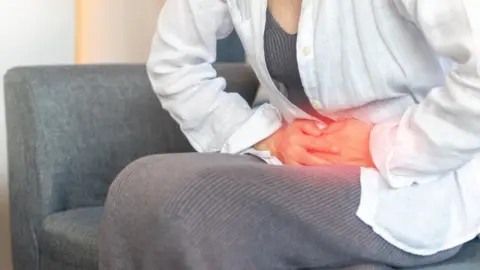Colitis: Portstewart woman warns of dangers of condition
 BBC
BBCA woman who has suffered from colitis for 15 years has said the condition can be life-threatening if not treated in time.
Gillian Coburn, from Portstewart, was diagnosed with microscopic colitis when she was 41.
The illness causes persistent diarrhoea, stomach pain, fatigue, incontinence and weight loss.
About 2,000 people in Northern Ireland have been diagnosed with microscopic colitis, the charity Guts UK said.
However, the organisation expects more people have the condition but are not yet diagnosed.
Guts UK also says 87.5% of people suffering with the condition are female - most of whom are diagnosed between the ages of 50 and 70.
"The problem is that because I have had it for so long, vital minerals and vitamins are not reabsorbed in the colon," said Ms Coburn.
"One of the things I was ending up in hospital for was low potassium levels and that can lead to heart failure and kidney failure," she explained.
Intestines surgically removed
Ms Coburn says she has tried to cope with the illness for as long as she could by limiting where she went and what she ate.
"You need to know where the toilet is everywhere," she said.
"I also had to be very careful about what I had eaten."
Eventually part of her intestines was surgically removed and Ms Coburn said she can now do things that she couldn't do before.
Julie Harrington, from Guts UK, said: "Further research is desperately needed to identify risk factors and find out why women are far more likely to suffer from microscopic colitis so we can move to a place where prevention and faster diagnosis is possible.
 Getty/Pornpak Khunatorn
Getty/Pornpak Khunatorn"In the meantime, I hope that this year's Microscopic Colitis Awareness Week will raise awareness of this extremely difficult condition and that sufferers discover the simple treatments that can make a huge and dramatic difference to their quality of life."
Prof Shaji Sebastian, consultant gastroenterologist at Hull University Teaching Hospitals NHS Trust and Guts UK trustee said scientists still don't fully understand what causes microscopic colitis and further research was needed to determine what could be a combination of factors.
"What we do know is that the condition can be very debilitating but with the right tests it's also very treatable.
"Early diagnosis is crucial to prevent patients from suffering when they don't have to, so my main message is don't suffer in silence and seek help from your GP if you're experiencing symptoms."
